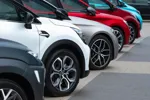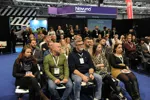These are just some of the everyday incidents that make the smooth running of the 2,400-strong former HM Customs and Excise (HMCE) fleet different from other firms. Another unique challenge it faces is the impact of HMCE being merged with the Inland Revenue to become HM Revenue and Customs (HMRC).
Operating such a diverse fleet is bound to throw up a few obstacles but, with a clear focus on risk management, reducing environmental impact and operational efficiency, John Webb, head of specialist fleet and radio communications, has a tight rein on the fleet.
Webb and his pre-merger team’s efforts have been recognised after they were named UK Fleet of the Year for the award sponsored by Avis UK at this year’s Fleet News Awards in March.
It is the second year running that HMCE has secured the title and although Webb is now spending more time restructuring HMRC’s radio communications, alongside national fleet manager, Helen Gibertson and 12 staff, he continues to oversee fleet strategy for specialist operational vehicles.
The specialist customs fleet includes more than 1,000 specially-converted vehicles and a covert surveillance fleet, as well as a number of mobile X-ray scanners, HGVs, motorbikes, firearms vehicles, dog vans, trailers and fork-lift trucks.
A large number of vehicles operate permanently airside at all major airports. He is also responsible for a worldwide fleet of vehicles including armoured cars in high-risk countries, which is why the fleet has to deal with such unusual incidents.
Webb said: ‘In a typical surveillance vehicle there is a vast array of extremely sophisticated surveillance devices which can cost as much as four times the value of the car. It is therefore vitally important that we take every measure to protect the identity of the vehicles and drivers. It would be virtually impossible for anyone to identify one of our cars.
‘The nature of our work is extremely diverse, specialised and often dangerous. Although there is a need for basic transport a lot of my team’s work is acting as an ‘intelligent customer’ turning frontline requirements into affordable solutions that are fit for purpose.
‘Recent examples of this include replacement road fuel testing vehicles, which are effectively mobile laboratories.’
Webb took over the HMCE fleet in 2002 after 26 years in the department as an investigator, policymaker and, in recent years, as a project manager involved in high-profile change projects.
He managed the HMCE fleet until April this year, when it merged with the Inland Revenue. Now he manages the specialist operational fleet and radio communications at HMRC. The new department’s fleet of 2,000 pool and job- need leased cars continues to be managed by the former Inland Revenue team in Nottingham.
Webb said: ‘We have a big emphasis on duty of care and we are proud of getting the HMCE accident rate down by 17.5%. In just one year we have reduced the accident rate of those in the highest risk category by 35%. We set a target to reduce the rate by 20% in three years and we have nearly hit that target in one year.’
HMCE is proactive in its approach to health and safety and risk issues on the fleet and Webb has regular contact with some of the industry’s leading associations. He said: ‘We are currently looking to introduce a range of measures to consolidate performance. It’s all about risk assessment, identifying, controlling risk and educating drivers.’
Another strong focus for the fleet is the environment and Webb is in control of the largest hybrid fleet in the UK. He has been progressively steering away from petrol variants and now has 120 petrol/electric hybrids and 67 petrol/liquefied petroleum gas (LPG) bi-fuel models. Where appropriate, Euro IV diesels have been chosen.
Webb said: ‘The hybrids have been really successful. Lots of fleet managers say there is not enough evidence to support the benefits but we have been prepared take risks and as a result we are also now a best practice case study for Transport Energy.
‘We have made mistakes, but in order to make steps changes in efficiency and effectiveness a fleet manager must be innovative and have the skills and knowledge to thoroughly research the options.
‘We are looking at taking the sustainable successes forward under the HMRC’s Corporate Social Responsibility strategy’.
Looking forward, Webb plans to consolidate and build on the current fleet system to reduce accidents, lower the impact on the environment, reduce business miles and introduce more fuel-efficient vehicles onto the fleet.
He has already reduced fleet running costs by over £1 million since 2002 and, as for delivering results, he says it is a case of balancing affordable budgets with drivers’ needs.
He added: ‘In this job, you need to align wider organisational strategies and vision with a commitment to improving operational efficiency and delivering service excellence.’
What the judges said
THE essence of an expertly run and managed fleet, HMCE has retained the crown it won so deservedly last year.
A structured renewal programme has reduced the age of the fleet, while it also boasts one of the biggest hybrid fleets in the country, with 120 vehicles. A commitment to professional training and ‘giving something back’ through its work with road safety charity Brake has been backed with a significant reduction in accident costs at the 2,400-vehicle fleet. Strong focus on integrating the DfT/HSE Driving at Work guidance into everyday fleet operations.
John Webb career profile
Various policy and management posts: 1976 – 1986
Specialist investigator: 1986 – 1991
Senior policy manager: 1991 – 1996
Alcohol and tobacco fraud review team: 1997
Functional manager for Centres of Operational Expertise: 1998 – 1999
Functional manager for shadow economy teams: 1999 – 2001
National fleet manager - 2002-2005
Head of specialist operational fleet and radio communications: 2005 – present
















Login to comment
Comments
No comments have been made yet.